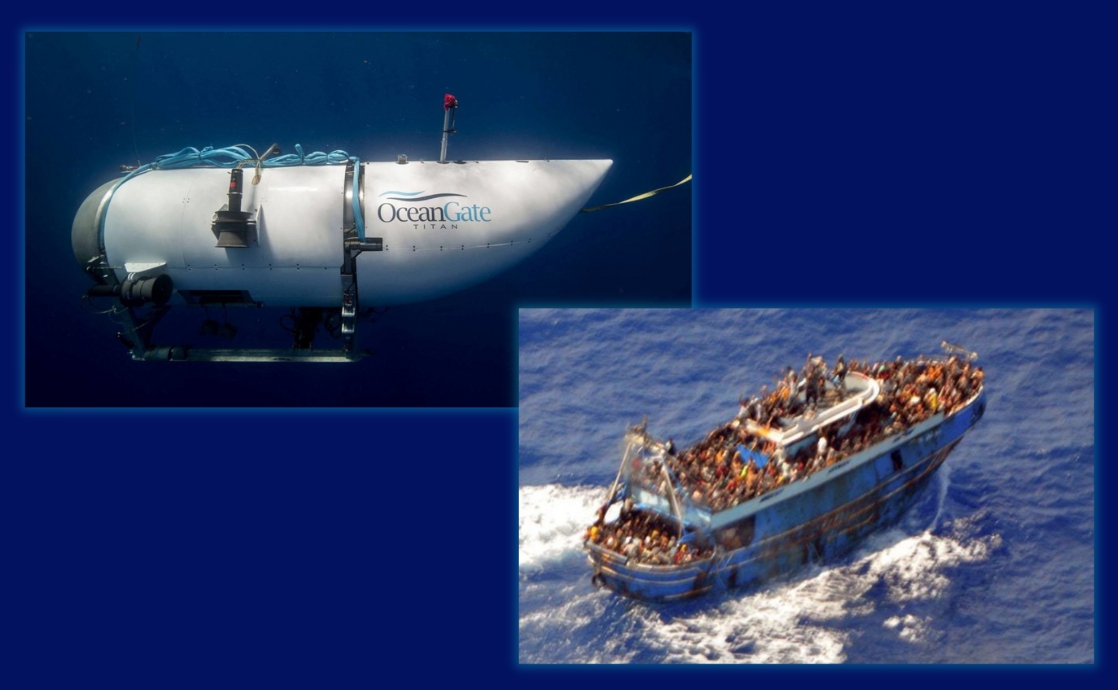The views expressed in our content reflect individual perspectives and do not represent the authoritative views of the Baha'i Faith.
The world has just witnessed two tragic events – the sinking of a refugee ship in the Mediterranean and the implosion of the Titan submersible. Let’s compare the two, and see what we can learn.
In each dreadful event, precious lives were lost.
The Titan, on a deep sea voyage to view the wreck of the Titanic in the North Atlantic, took the lives of five people. The fishing boat named the Andriana, carrying 750 refugees, capsized and sank in the Mediterranean between Libya and Greece, taking the lives of approximately 650 people.
But what was it that appeared to make some lives more precious than many, many others?
On June 14, when the Andriana capsized, the overloaded vessel was carrying approximately 750 migrants – primarily from the Middle East and South Asia, all seeking asylum in Europe. Although countless European authorities knew the boat was in trouble, multiple news organizations reported and later confirmed that nothing was done to assist with rescue efforts.
RELATED: Refugees: A New Parable of the Good Samaritan
NBC reported that “under international maritime law, authorities are not only obligated to conduct immediate rescue operations, but they’re also required to do so without any explicit plea for help. Instead, a coast guard vessel watched as the vessel sank in minutes.” One survivor told a hospital doctor in Kalamata, Greece, that he had seen 100 children in the hold of the boat.
Despite this horrible tragedy, the media showed only a fraction of the consideration and responsiveness to the plight of the refugees than it did to the plight of the five undersea explorers. The world as a whole, perhaps fatigued from hearing stories of the over 20,000 people who have died or disappeared in the central Mediterranean since 2014, seemed strangely ambivalent about the Andriana tragedy.
Four days later on Sunday, June 18th, 1 hour and 45 minutes after starting its 12,500-foot descent, the experimental Titan submersible lost communications. Immediately a host of countries responded with emergency search-and-rescue measures, creating a vast campaign of frantic search for the lost vessel.
According to Wikipedia, “the search and rescue operation was conducted by an international team led by the United States Coast Guard, United States Navy, and the Canadian Coast Guard. Support was provided by aircraft from the Royal Canadian Air Force and United States Air National Guard, France, and a Royal Canadian Navy ship, as well as several commercial and research vessels and ROVs (remotely operated vehicles.) The cost estimation for the search by the U.S. government alone for the Titan is about $934,000 to date, according to The Washington Post and U.S. defense budget estimates.
Saturation news coverage that went on for many days drove massive interest and attention worldwide, with an abundant amount of concern and sympathy expressed for the five adventurers. The lost experimental Titan and its multi-billionaire travelers seemed to captivate the world.
In the submersible, five lives were lost. In the fishing boat, more than 600 perished. What is the reason for this glaring disparity? Why can’t our global news media respond to disasters equitably, fairly, and without assigning importance and value to some lives while according little to others?
The Baha’i teachings proclaim that every soul is a Divine creation, and that all are equal, regardless of gender, race, sexuality, religion, class, physical ability, nationality, or possessions. Abdu’l-Baha, in a speech he gave in Paris early in the 20th century, said:
A financier with colossal wealth should not exist whilst near him is a poor man in dire necessity. When we see poverty allowed to reach a condition of starvation it is a sure sign that somewhere we shall find tyranny. Men must bestir themselves in this matter, and no longer delay in altering conditions which bring the misery of grinding poverty to a very large number of the people. The rich must give of their abundance, they must soften their hearts and cultivate a compassionate intelligence, taking thought for those sad ones who are suffering from lack of the very necessities of life.
There must be special laws made, dealing with these extremes of riches and of want. The members of the Government should consider the laws of God when they are framing plans for the ruling of the people. The general rights of mankind must be guarded and preserved.
The government of the countries should conform to the Divine Law which gives equal justice to all. This is the only way in which the deplorable superfluity of great wealth and miserable, demoralizing, degrading poverty can be abolished.
Regardless of our material wealth or lack of it, each human soul has a noble destiny and a lofty purpose. Each individual is a member of the human family and contributes to civilization.
These two disasters have something important to tell us – that the inordinate gap between rich and poor, a source of acute suffering for billions of our brothers and sisters, keeps the world in a state of instability. Because they prioritize the lives of the wealthy over the lives of the poor, few societies have dealt effectively with this situation.
From a Baha’i perspective, the solution calls for the combined application of spiritual, moral, and practical approaches. The democratically-elected Baha’i leadership body, the Universal House of Justice, wrote in 1985 that the entire world must now urgently reevaluate the wealth gap and develop a spiritual solution to our planet’s economic disparities:
A fresh look at the problem is required, entailing consultation with experts from a wide spectrum of disciplines, devoid of economic and ideological polemics, and involving the people directly affected in the decisions that must urgently be made.
Baha’is around the globe continue working to eliminate the extremes of wealth and poverty and are making dedicated efforts to alleviate such disparities.
In addition to highlighting the dire extremes of wealth and poverty in our world, these recent events also shine a light on the glaring lack of attention to the issue of racial inequality in our society. To be perfectly fair, and I think most people would agree, if 750 Caucasians were in danger at sea, we would likely see a plethora of resources going out immediately to their aid. Instead, the world witnessed hundreds of honorable souls in peril and did little to rescue them. What made these refugees less worthy of the world’s attention? They should have been more worthy of our consideration, because of the dismal conditions of extreme poverty, instability, and hunger they gave their lives to escape.
RELATED: Baha’is and Immigration: How to Build a World Without Borders
In 1938, Shoghi Effendi, the Guardian of the Baha’i Faith, wrote that “racial prejudice, the corrosion of which, for well-nigh a century, has bitten into the fiber, and attacked the whole social structure of American society,” should “be regarded as constituting the most vital and challenging issue confronting” the United States. Of course, the United States has no monopoly on racism – and the Andriana tragedy proves it.
So ask yourself: why were the lives of the perished five people on the Titan valued so much more highly than that of the deceased hundreds on the Andriana? Dare we postulate for even a moment that one soul is to be worth more than another because of their race, gender, or social status? We are all worthy. We all have hopes and dreams, families and loved ones. We all contribute to society with special talents and faculties, unique and precious – and when we close our eyes at night we all pray to the same loving God that created us, equal, treasured, and noble.
Let’s see if we can reverse these prejudices and all try to live up to this Baha’i standard, as Abdu’l-Baha expressed in his writings:
Today the one overriding need is unity and harmony among the beloved of the Lord, for they should have among them but one heart and soul and should, so far as in them lieth, unitedly withstand the hostility of all the peoples of the world; they must bring to an end the benighted prejudices of all nations and religions and must make known to every member of the human race that all are the leaves of one branch, the fruits of one bough.
















Comments
Sign in or create an account
Continue with Googleor